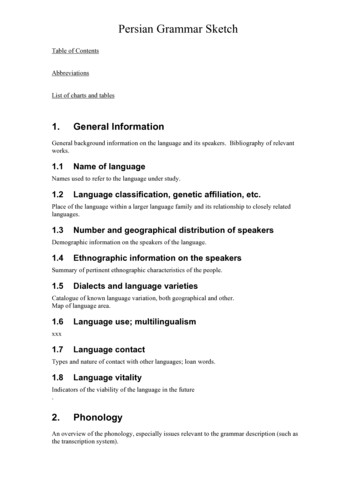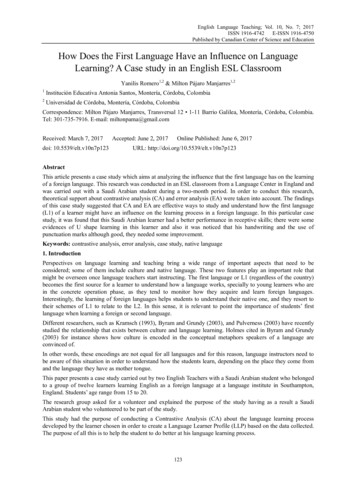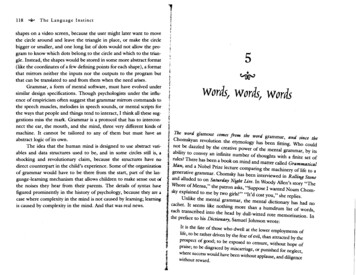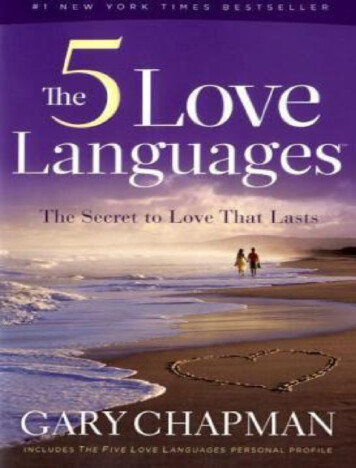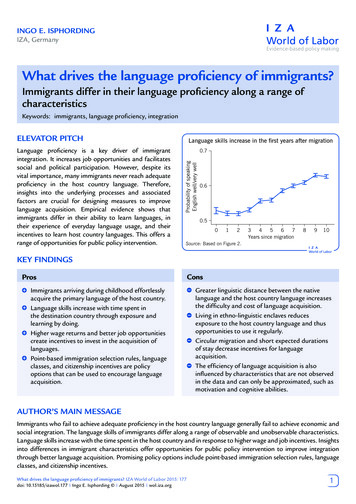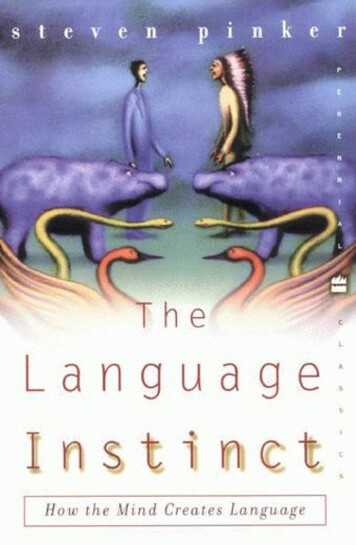
Transcription
STEVENTHEPINKERLANGUAGEINSTINCTThe New Science of Language and MindPENGUIN BOOKS
forHarry and Roslyn Pinkerwho gave me language
PrefaceI have never met a person who is not interested in language.I wrote this book to try to satisfy that curiosity. Language is beginningto submit to that uniquely satisfying kind of understanding that wecall science, but the news has been kept a secret.For the language lover, I hope to show that there is a world ofelegance and richness in quotidian speech that far outshines the localcuriosities of etymologies, unusual words, and fine points of usage.For the reader of popular science, I hope to explain what is behindthe recent discoveries (or, in many cases, nondiscoveries) reported inthe press: universal deep structures, brainy babies, grammar genes,artificially intelligent computers, neural networks, signing chimps,talking Neanderthals, idiot savants, feral children, paradoxical braindamage, identical twins separated at birth, color pictures of the thinking brain, and the search for the mother of all languages. I also hopeto answer many natural questions about languages, like why there areso many of them, why they are so hard for adults to learn, and whyno one seems to know the plural of Walkman.For students unaware of the science of language and mind, orworse, burdened with memorizing word frequency effects on lexicaldecision reaction time or the fine points of the Empty CategoryPrinciple, I hope to convey the grand intellectual excitement thatlaunched the modern study of language several decades ago.For my professional colleagues, scattered across so many disciplinesand studying so many seemingly unrelated topics, I hope to offer asemblance of an integration of this vast territory. Although I am an7
8Prefaceopinionated, obsessional researcher who dislikes insipid compromisesthat fuzz up the issues, many academic controversies remind me ofthe blind men palpating the elephant. If my personal synthesis seemsto embrace both sides of debates like "formalism versus functionalism" or "syntax versus semantics versus pragmatics," perhaps it isbecause there was never an issue there to begin with.For the general nonfiction reader, interested in language and human beings in the broadest sense, I hope to offer something differentfrom the airy platitudes—Language Lite—that typify discussions oflanguage (generally by people who have never studied it) in thehumanities and sciences alike. For better or worse, I can write in onlyone way, with a passion for powerful, explanatory ideas, and a torrentof relevant detail. Given this last habit, I am lucky to be explaininga subject whose principles underlie wordplay, poetry, rhetoric, wit,and good writing. I have not hesitated to show off my favorite examples of language in action from pop culture, ordinary children andadults, the more flamboyant academic writers in my field, and someof the finest stylists in English.This book, then, is intended for everyone who uses language, andthat means everyone!I owe thanks to many people. First, to Leda Cosmides, NancyEtcoff, Michael Gazzaniga, Laura Ann Petitto, Harry Pinker, RobertPinker, Roslyn Pinker, Susan Pinker, John Tooby, and especiallyIlavenil Subbiah, for commenting on the manuscript and generouslyoffering advice and encouragement.My home institution, the Massachusetts Institute of Technology, isa special environment for the study of language, and I am gratefulto the colleagues, students, and former students who shared theirexpertise. Noam Chomsky made penetrating criticisms and helpfulsuggestions, and Ned Block, Paul Bloom, Susan Carey, Ted Gibson,Morris Halle, and Michael Jordan helped me think through the issuesin several chapters. Thanks go also to Hilary Bromberg, Jacob Feldman, John Houde, Samuel Jay Keyser, John J. Kim, Gary Marcus,Neal Perlmutter, David Pesetsky, David Poppel, Annie Senghas,Karin Stromswold, Michael Tarr, Marianne Teuber, Michael Ullman,Kenneth Wexler, and Karen Wynn for erudite answers to questionsranging from sign language to obscure ball players and guitarists. TheDepartment of Brain and Cognitive Sciences' librarian, Pat Claffey,and computer system manager, Stephen G. Wadlow, those most
Preface9admirable prototypes of their professions, offered dedicated, experthelp at many stages.Several chapters benefited from the scrutiny of real mavens, and Iam grateful for their technical and stylistic comments: Derek Bickerton, David Caplan, Richard Dawkins, Nina Dronkers, Jane Grimshaw, Misia Landau, Beth Levin, Alan Prince, and Sarah G.Thomason. I also thank my colleagues in cyberspace who indulgedmy impatience by replying, sometimes in minutes, to my electronicqueries: Mark Aronoff, Kathleen Baynes, Ursula Bellugi, DorothyBishop, Helena Cronin, Lila Gleitman, Myrna Gopnik, Jacques Guy,Henry Kucera, Sigrid Lipka, Jacques Mehler, Elissa Newport, AlexRudnicky, Jenny Singleton, Virginia Valian, and Heather Van derLely. A final thank you to Alta Levenson of Bialik High School forher help with the Latin.I am happy to acknowledge the special care lavished by JohnBrockman, my agent, Ravi Mirchandani, my editor at Penguin Books,and Maria Guarnaschelli, my editor at William Morrow; Maria's wiseand detailed advice vastly improved the final manuscript. KatarinaRice copy-edited my first two books, and I am delighted that sheagreed to my request to work with me on this one, especially considering some of the things I say in Chapter 12.My own research on language has been supported by the NationalInstitutes of Health (grant HD 18381) and the National ScienceFoundation (grant BNS 91-09766), and by the McDonnell-Pew Center for Cognitive Neuroscience at MIT.
Contents1. An Instinct to Acquire an Art 152. Chatterboxes 253. Mentalese 554 . How Language Works 8 35. Words, Words, Words 1266. The Sounds of Silence 1587. Talking Heads 1928. The Tower of Babel 2 3 19. Baby Born Talking—Describes Heaven 2 6 210. Language Organs and Grammar Genes 2 9 71 1 . The Big Bang 3 3 212. The Language Mavens 3 7 013. Mind Design 4 0 4Glossary 43111
1An Instinctto Acquire an ArtAs you are reading these words, you are taking part in oneof the wonders of the natural world. For you and I belong to a specieswith a remarkable ability: we can shape events in each other's brainswith exquisite precision. I am not referring to telepathy or mindcontrol or the other obsessions of fringe science; even in the depictions of believers these are blunt instruments compared to an abilitythat is uncontroversially present in every one of us. That ability islanguage. Simply by making noises with our mouths, we can reliablycause precise new combinations of ideas to arise in each other'sminds. The ability comes so naturally that we are apt to forget whata miracle it is. So let me remind you with some simple demonstrations.Asking you only to surrender your imagination to my words for a fewmoments, I can cause you to think some very specific thoughts:When a male octopus spots a female, his normally grayish bodysuddenly becomes striped. He swims above the female and beginscaressing her with seven of his arms. If she allows this, he willquickly reach toward her and slip his eighth arm into her breathingtube. A series of sperm packets moves slowly through a groove inhis arm, finally to slip into the mantle cavity of the female.Cherries jubilee on a white suit? Wine on an altar cloth? Apply clubsoda immediately. It works beautifully to remove the stains fromfabrics.When Dixie opens the door to Tad, she is stunned, because shethought he was dead. She slams it in his face and then tries to15
16THE L A N G U A G E I N S T I N C Tescape. However, when Tad says, "I love you," she lets him in. Tadcomforts her, and they become passionate. When Brian interrupts,Dixie tells a stunned Tad that she and Brian were married earlierthat day. With much difficulty, Dixie informs Brian that things arenowhere near finished between her and Tad. Then she spills thenews that Jamie is Tad's son. "My what?" says a shocked Tad.Think about what these words have done. I did not simply remindyou of octopuses; in the unlikely event that you ever see one developstripes, you now know what will happen next. Perhaps the next timeyou are in a supermarket you will look for club soda, one out of thetens of thousands of items available, and then not touch it untilmonths later when a particular substance and a particular objectaccidentally come together. You now share with millions of otherpeople the secrets of protagonists in a world that is the product ofsome stranger's imagination, the daytime drama All My Children.True, my demonstrations depended on our ability to read and write,and this makes our communication even more impressive by bridginggaps of time, space, and acquaintanceship. But writing is clearly anoptional accessory; the real engine of verbal communication is thespoken language we acquired as children.In any natural history of the human species, language would standout as the preeminent trait. To be sure, a solitary human is an impressive problem-solver and engineer. But a race of Robinson Crusoeswould not give an extraterrestrial observer all that much to remarkon. What is truly arresting about our kind is better captured in thestory of the Tower of Babel, in which humanity, speaking a singlelanguage, came so close to reaching heaven that God himself feltthreatened. A common language connects the members of a community into an information-sharing network with formidable collectivepowers. Anyone can benefit from the strokes of genius, lucky accidents, and trial-and-error wisdom accumulated by anyone else, present or past. And people can work in teams, their efforts coordinatedby negotiated agreements. As a result, Homo sapiens is a species,like blue-green algae and earthworms, that has wrought far-reachingchanges on the planet. Archeologists have discovered the bones often thousand wild horses at the bottom of a cliff in France, theremains of herds stampeded over the clifftop by groups of paleolithichunters seventeen thousand years ago. These fossils of ancient cooper-
An Instinct to Acquire an Art17ation and shared ingenuity may shed light on why saber-tooth tigers,mastodons, giant woolly rhinoceroses, and dozens of other large mammals went extinct around the time that modern humans arrived intheir habitats. Our ancestors, apparently, killed them off.Language is so tightly woven into human experience that it isscarcely possible to imagine life without it. Chances are that if youfind two or more people together anywhere on earth, they will soonbe exchanging words. When there is no one to talk with, people talkto themselves, to their dogs, even to their plants. In our social relations, the race is not to the swift but to the verbal—the spellbindingorator, the silver-tongued seducer, the persuasive child who wins thebattle of wills against a brawnier parent. Aphasia, the loss of languagefollowing brain injury, is devastating, and in severe cases family members may feel that the whole person is lost forever.This book is about human language. Unlike most books with "language" in the title, it will not chide you about proper usage, trace theorigins of idioms and slang, or divert you with palindromes, anagrams,eponyms, or those precious names for groups of animals like "exaltation of larks." For I will be writing not about the English languageor any other language, but about something much more basic: theinstinct to learn, speak, and understand language. For the first timein history, there is something to write about it. Some thirty-five yearsago a new science was born. Now called "cognitive science," it combines tools from psychology, computer science, linguistics, philosophy, and neurobiology to explain the workings of human intelligence.The science of language, in particular, has seen spectacular advancesin the years since. There are many phenomena of language that weare coming to understand nearly as well as we understand how acamera works or what the spleen is for. I hope to communicate theseexciting discoveries, some of them as elegant as anything in modernscience, but I have another agenda as well.The recent illumination of linguistic abilities has revolutionary implications for our understanding of language and its role in humanaffairs, and for our view of humanity itself. Most educated peoplealready have opinions about language. They know that it is man'smost important cultural invention, the quintessential example of hiscapacity to use symbols, and a biologically unprecedented event irrevocably separating him from other animals. They know that languagepervades thought, with different languages causing their speakers to
18THE LANGUAGE I N S T I N C Tconstrue reality in different ways. They know that children learn totalk from role models and caregivers. They know that grammaticalsophistication used to be nurtured in the schools, but sagging educational standards and the debasements of popular culture have led toa frightening decline in the ability of the average person to constructa grammatical sentence. They also know that English is a zany, logicdefying tongue, in which one drives on a parkway and parks in adriveway, plays at a recital and recites at a play. They know thatEnglish spelling takes such wackiness to even greater heights—George Bernard Shaw complained that fish could just as sensibly bespelled ghoti (gh as in tough, o as in women, ti as in nation)—andthat only institutional inertia prevents the adoption of a more rational,spell-it-like-it-sounds system.In the pages that follow, I will try to convince you that every oneof these common opinions is wrong! And they are all wrong for asingle reason. Language is not a cultural artifact that we learn the waywe learn to tell time or how the federal government works. Instead,it is a distinct piece of the biological makeup of our brains. Languageis a complex, specialized skill, which develops in the child spontaneously, without conscious effort or formal instruction, is deployedwithout awareness of its underlying logic, is qualitatively the same inevery individual, and is distinct from more general abilities to processinformation or behave intelligently. For these reasons some cognitivescientists have described language as a psychological faculty, a mentalorgan, a neural system, and a computational module. But I prefer theadmittedly quaint term "instinct." It conveys the idea that peopleknow how to talk in more or less the sense that spiders know how tospin webs. Web-spinning was not invented by some unsung spidergenius and does not depend on having had the right education or onhaving an aptitude for architecture or the construction trades. Rather,spiders spin spider webs because they have spider brains, which givethem the urge to spin and the competence to succeed. Although thereare differences between webs and words, I will encourage you to seelanguage in this way, for it helps to make sense of the phenomena wewill explore.Thinking of language as an instinct inverts the popular wisdom,especially as it has been passed down in the canon of the humanitiesand social sciences. Language is no more a cultural invention than isupright posture. It is not a manifestation of a general capacity to use
An Instinct to Acquire an Art19symbols: a three-year-old, we shall see, is a grammatical genius, butis quite incompetent at the visual arts, religious iconography, trafficsigns, and the other staples of the semiotics curriculum. Thoughlanguage is a magnificent ability unique to Homo sapiens among livingspecies, it does not call for sequestering the study of humans fromthe domain of biology, for a magnificent ability unique to a particularliving species is far from unique in the animal kingdom. Some kindsof bats home in on flying insects using Doppler sonar. Some kinds ofmigratory birds navigate thousands of miles by calibrating the positions of the constellations against the time of day and year. In nature'stalent show we are simply a species of primate with our own act, aknack for communicating information about who did what to whomby modulating the sounds we make when we exhale.Once you begin to look at language not as the ineffable essence ofhuman uniqueness but as a biological adaptation to communicateinformation, it is no longer as tempting to see language as an insidiousshaper of thought, and, we shall see, it is not. Moreover, seeinglanguage as one of nature's engineering marvels—an organ with "thatperfection of structure and co-adaptation which justly excites ouradmiration," in Darwin's words—gives us a new respect for yourordinary Joe and the much-maligned English language (or any language). The complexity of language, from the scientist's point of view,is part of our biological birthright; it is not something that parentsteach their children or something that must be elaborated in school—as Oscar Wilde said, "Education is an admirable thing, but it is wellto remember from time to time that nothing that is worth knowingcan be taught." A preschooler's tacit knowledge of grammar is moresophisticated than the thickest style manual or the most state-of-theart computer language system, and the same applies to all healthyhuman beings, even the notorious syntax-fracturing professional athlete and the, you know, like, inarticulate teenage skateboarder. Finally, since language is the product of a well-engineered biologicalinstinct, we shall see that it is not the nutty barrel of monkeys thatentertainer-columnists make it out to be. I will try to restore somedignity to the English vernacular, and will even have some nice thingsto say about its spelling system.The conception of language as a kind of instinct was first articulatedin 1871 by Darwin himself. In The Descent of Man he had to contendwith language because its confinement to humans seemed to present
20THE L A N G U A G E I N S T I N C Ta challenge to his theory. As in all matters, his observations areuncannily modern:As . . . one of the founders of the noble science of philology observes, language is an art, like brewing or baking; but writing wouldhave been a better simile. It certainly is not a true instinct, for everylanguage has to be learned. It differs, however, widely from allordinary arts, for man has an instinctive tendency to speak, as wesee in the babble of our young children; while no child has aninstinctive tendency to brew, bake, or write. Moreover, no philologist now supposes that any language has been deliberately invented;it has been slowly and unconsciously developed by many steps.Darwin concluded that language ability is "an instinctive tendency toacquire an art," a design that is not peculiar to humans but seen inother species such as song-learning birds.A language instinct may seem jarring to those who think of languageas the zenith of the human intellect and who think of instincts asbrute impulses that compel furry or feathered zombies to build a damor up and fly south. But one of Darwin's followers, William James,noted that an instinct possessor need not act as a "fatal automaton."He argued that we have all the instincts that animals do, and manymore besides; our flexible intelligence comes from the interplay ofmany instincts competing. Indeed, the instinctive nature of humanthought is just what makes it so hard for us to see that it is an instinct:It takes . . . a mind debauched by learning to carry the process ofmaking the natural seem strange, so far as to ask for the why ofany instinctive human act. To the metaphysician alone can suchquestions occur as: Why do we smile, when pleased, and not scowl?Why are we unable to talk to a crowd as we talk to a single friend?Why does a particular maiden turn our wits so upside-down? Thecommon man can only say, "Of course we smile, of course our heartpalpitates at the sight of the crowd, of course we love the maiden,that beautiful soul clad in that perfect form, so palpably and flagrandy made for all eternity to be loved!"And so, probably, does each animal feel about the particularthings it tends to do in presence of particular objects. . . . To thelion it is the lioness which is made to be loved; to the bear, the she-
An Instinct to Acquire an Art2 1bear. To the broody hen the notion would probably seem monstrousthat there should be a creature in the world to whom a nestful ofeggs was not the utterly fascinating and precious and never-to-betoo-much-sat-upon object which it is to her.Thus we may be sure that, however mysterious some animals'instincts may appear to us, our instincts will appear no less mysterious to them. And we may conclude that, to the animal which obeysit, every impulse and every step of every instinct shines with its ownsufficient light, and seems at the moment the only eternally rightand proper thing to do. What voluptuous thrill may not shake a fly,when she at last discovers the one particular leaf, or carrion, or bitof dung, that out of all the world can stimulate her ovipositor to itsdischarge? Does not the discharge then seem to her the only fittingthing? And need she care or know anything about the future maggotand its food?I can think of no better statement of my main goal. The workingsof language are as far from our awareness as the rationale for egglaying is from the fly's. Our thoughts come out of our mouths soeffortlessly that they often embarrass us, having eluded our mentalcensors. When we are comprehending sentences, the stream of wordsis transparent; we see through to the meaning so automatically thatwe can forget that a movie is in a foreign language and subtitled. Wethink children pick up their mother tongue by imitating their mothers,but when a child says Don't giggle me! or We holded the baby rabbits,it cannot be an act of imitation. I want to debauch your mind withlearning, to make these natural gifts seem strange, to get you to askthe "why" and "how" of these seemingly homely abilities. Watch animmigrant struggling with a second language or a stroke patient witha first one, or deconstruct a snatch of baby talk, or try to program acomputer to understand English, and ordinary speech begins to lookdifferent. The effortlessness, the transparency, the automaticity areillusions, masking a system of great richness and beauty.In this century, the most famous argument that language is like aninstinct comes from Noam Chomsky, the linguist who first unmaskedthe intricacy of the system and perhaps the person most responsiblefor the modern revolution in language and cognitive science. In the1950s the social sciences were dominated by behaviorism, the schoolof thought popularized by John Watson and B. F. Skinner. Mental
22THE L A N G U A G E I N S T I N C Tterms like "know" and "think" were branded as unscientific; "mind"and "innate" were dirty words. Behavior was explained by a few lawsof stimulus-response learning that could be studied with rats pressingbars and dogs salivating to tones. But Chomsky called attention totwo fundamental facts about language. First, virtually every sentencethat a person utters or understands is a brand-new combination ofwords, appearing for the first time in the history of the universe.Therefore a language cannot be a repertoire of responses; the brainmust contain a recipe or program that can build an unlimited set ofsentences out of a finite list of words. That program may be called amental grammar (not to be confused with pedagogical or stylistic"grammars," which are just guides to the etiquette of written prose).The second fundamental fact is that children develop these complexgrammars rapidly and without formal instruction and grow up to giveconsistent interpretations to novel sentence constructions that theyhave never before encountered. Therefore, he argued, children mustinnately be equipped with a plan common to the grammars of alllanguages, a Universal Grammar, that tells them how to distill thesyntactic patterns out of the speech of their parents. Chomsky put itas follows:It is a curious fact about the intellectual history of the past fewcenturies that physical and mental development have been approached in quite different ways. No one would take seriously theproposal that the human organism learns through experience tohave arms rather than wings, or that the basic structure of particularorgans results from accidental experience. Rather, it is taken forgranted that the physical structure of the organism is geneticallydetermined, though of course variation along such dimensions assize, rate of development, and so forth will depend in part onexternal factors.The development of personality, behavior patterns, and cognitivestructures in higher organisms has often been approached in a verydifferent way. It is generally assumed that in these domains, socialenvironment is the dominant factor. The structures of mind thatdevelop over time are taken to be arbitrary and accidental; there isno "human nature" apart from what develops as a specific historicalproduct.But human cognitive systems, when seriously investigated, prove
An Instinct to Acquire an Art23to be no less marvelous and intricate than the physical structuresthat develop in the life of the organism. Why, then, should we notstudy the acquisition of a cognitive structure such as language moreor less as we study some complex bodily organ?At first glance, the proposal may seem absurd, if only because ofthe great variety of human languages. But a closer considerationdispels these doubts. Even knowing very little of substance aboutlinguistic universals, we can be quite sure that the possible variety oflanguage is sharply limited. . . . The language each person acquires isa rich and complex construction hopelessly underdetermined bythe fragmentary evidence available [to the child]. Nevertheless individuals in a speech community have developed essentially the samelanguage. This fact can be explained only on the assumption thatthese individuals employ highly restrictive principles that guide theconstruction of grammar.By performing painstaking technical analyses of the sentences ordinary people accept as part of their mother tongue, Chomsky andother linguists developed theories of the mental grammars underlyingpeople's knowledge of particular languages and of the UniversalGrammar underlying the particular grammars. Early on, Chomsky'swork encouraged other scientists, among them Eric Lenneberg,George Miller, Roger Brown, Morris Halle, and Alvin Liberman, toopen up whole new areas of language study, from child developmentand speech perception to neurology and genetics. By now, the community of scientists studying the questions, he raised numbers in thethousands. Chomsky is currently among the ten most-cited writers inall of the humanities (beating out Hegel and Cicero and trailing onlyMarx, Lenin, Shakespeare, the Bible, Aristotle, Plato, and Freud) andthe only living member of the top ten.What those citations say is another matter. Chomsky gets peopleexercised. Reactions range from the awe-struck deference ordinarilyreserved for gurus of weird religious cults to the withering invective thatacademics have developed into a high art. In part this is because Chomsky attacks what is still one of the foundations of twentieth-centuryintellectual life—the "Standard Social Science Model," according towhich the human psyche is molded by the surrounding culture. But itis also because no thinker can afford to ignore him. As one of his severestcritics, the philosopher Hilary Putnam, acknowledges,
24THE L A N G U A G E I N S T I N C TWhen one reads Chomsky, one is struck by a sense of great intellectual power; one knows one is encountering an extraordinary mind.And this is as much a matter of the spell of his powerful personalityas it is of his obvious intellectual virtues: originality, scorn for thefaddish and the superficial; willingness to revive (and the ability torevive) positions (such as the "doctrine of innate ideas") that hadseemed passe; concern with topics, such as the structure of thehuman mind, that are of central and perennial importance.The story I will tell in this book has, of course, been deeply influenced by Chomsky. But it is not his story exactly, and I will not tellit as he would. Chomsky has puzzled many readers with his skepticismabout whether Darwinian natural selection (as opposed to other evolutionary processes) can explain the origins of the language organthat he argues for; I think it is fruitful to consider language as anevolutionary adaptation, like the eye, its major parts designed to carryout important functions. And Chomsky's arguments about the natureof the language faculty are based on technical analyses of word andsentence structure, often couched in abstruse formalisms. His discussions of flesh-and-blood speakers are perfunctory and highly idealized. Though I happen to agree with many of his arguments, I thinkthat a conclusion about the mind is convincing only if many kinds ofevidence converge on it. So the story in this book is highly eclectic,ranging from how DNA builds brains to the pontifications of newspaper language columnists. The best place to begin is to ask why anyoneshould believe that human language is a part of human biology—aninstinct—at all.
2ChatterboxesBy the 1920s it was thought that no corner of the earth fitfor human habitation had remained unexplored. New Guinea, theworld's second largest island, was no exception. The European missionaries, planters, and administrators clung to its coastal lowlands,convinced that no one could live in the treacherous mountain rangethat ran in a solid line down the middle of the island. But the mountains visible from each coast in fact belonged to two ranges, not one,and between them was a temperate plateau crossed by many fertilevalleys. A million Stone Age people lived in those highlands, isolatedfrom the rest of the world for forty t
The New Science of Language and Mind PENGUIN BOOKS . for Harry and Roslyn Pinker who gave me language . Preface I have never met a person who is not interested in language. I wrote this book to try to satisfy that curiosity. Language is beginning to submit


